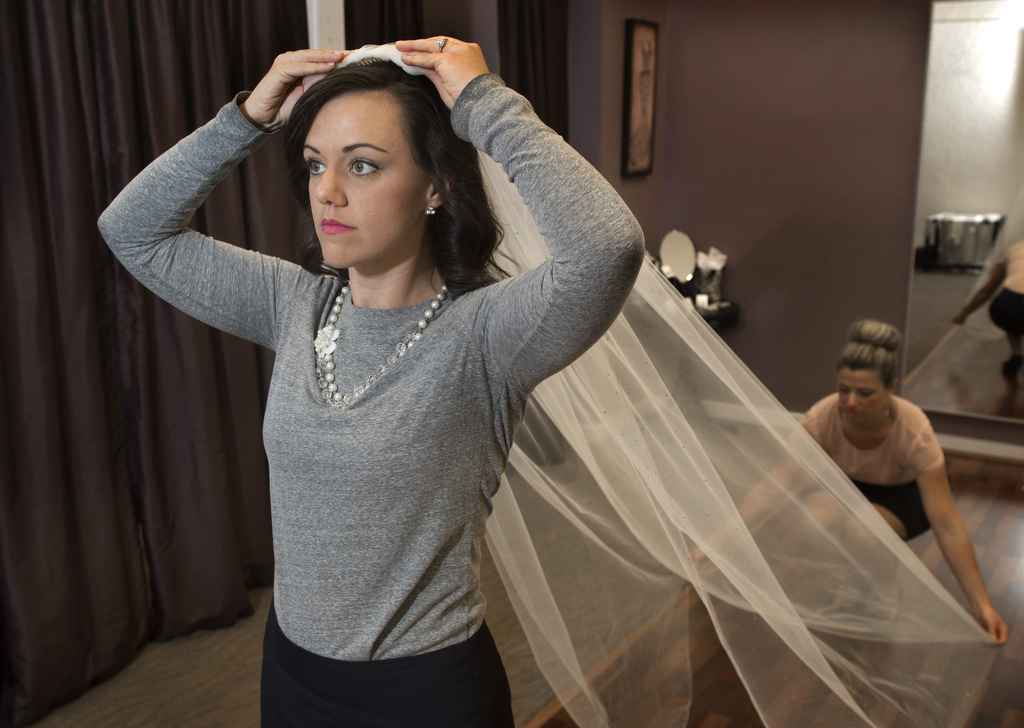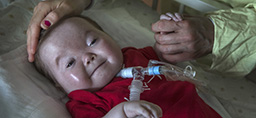Andrea Wolschleger beams as she talks about her upcoming wedding day and the blissful Caribbean honeymoon planned for December.
But amid the whirlwind of wedding plans, one pesky detail nags at her with the persistence of a buzzing mosquito.
Zika.
How worried should she be about that mosquito-borne virus linked to severe birth defects? Should she change their honeymoon locale to someplace less tropical, say, Alaska?
She has seen the general advice about avoiding Zika―use mosquito repellant and wear long-sleeved shirts and slacks. But she wonders how far to take the precautions when she and her new hubby, Eric Finnigan, lounge beside the ocean in Punta Cana, Dominican Republic, on a beautiful, sun-drenched day.
“Are you going to be lying out in a hazmat suit?” she asks.
Wolschleger, a communications specialist for Spectrum Health, is not the only one who wishes she could swat away her Zika worries. Her colleague Bethany Johnson shares her concern.
Like Wolschleger, Johnson has a September wedding date and plans to honeymoon in December. Her fiancé, Brad Bucklew, is arranging their trip, which she is sure will be perfect. The location is a surprise, but she knows it’s in a warm-weather destination where Zika has surfaced.
The key Zika concern for both brides is whether the virus could pose a threat to their children when they start a family.
Although Zika is spread primarily by the Aedes mosquito, it also can be transmitted through sexual contact. Health officials say it stays in semen longer than in blood.
World health officials blame the virus for Brazil’s spike in cases of microcephaly, a birth defect that causes a baby to have a small head and brain damage.
Zika-carrying mosquitoes have popped up in countries throughout the Caribbean, according to the Centers for Disease Control and Prevention.
“You wouldn’t want to have that risk for your child,” Johnson said.
Neither bride plans on a honeymoon pregnancy. But they wonder how long they should wait post-trip before starting a family. And because babies have a way of upending the best-laid plans, they worry about possible risks if they do conceive before or during the honeymoon, despite precautions.
“What if you don’t know you’re pregnant when you go?” Johnson said. “What if it’s week one (of the pregnancy) and you get bit by a mosquito on day two?”
“It’s just so prevalent in the media that it’s hard to ignore,” Wolschleger said. “We are not talking about having children right away, but I am concerned about the lasting effects. How long does it stay in our system?”
In reading bridal publications, the brides have seen little advice specifically about Zika and honeymoons.
That said, Spectrum Health Beat took the brides’ questions to Vivian Romero, MD, a maternal fetal medicine specialist with Spectrum Health Medical Group.
New information on Zika emerges almost daily, and there’s no definitive answer to every question. But given what medical experts know today, Dr. Romero has provided her take on Zika and honeymoons.
Q&A: Zika virus
How long after you return from an area with Zika should a couple wait before trying to get pregnant? Is it a different length of time for men vs. women?
Precautions
Anyone traveling to a Zika country can take precautions to improve the chances of avoiding the virus.
Take steps to prevent mosquito bites, and prevent sexual transmission of the Zika virus by using condoms, said Vivian Romero, MD, a maternal fetal medicine specialist with Spectrum Health Medical Group.
Some steps to avoid mosquitoes:
- Wear long-sleeved shirts and long pants.
- Stay in places with air conditioning and window and door screens to keep mosquitoes outside.
- Sleep under a mosquito bed net if you are overseas or outside and unable to protect yourself from mosquito bites.
Repellants
Use Environmental Protection Agency (EPA)-registered insect repellents with one of the following active ingredients: DEET, picaridin, IR3535, oil of lemon eucalyptus, or para-menthane-diol. When used as directed, EPA-registered insect repellents are proven safe and effective, even for pregnant and breast-feeding women.
- Always follow the product label instructions.
- Reapply insect repellent as directed.
- If you are also using sunscreen, apply sunscreen before applying insect repellent.
To protect your child from mosquito bites:
- Do not use insect repellent on babies younger than 2 months old.
- Do not use products containing oil of lemon eucalyptus or para-menthane-diol on children younger than age 3.
- Dress your child in clothing that covers arms and legs.
- Cover crib, stroller and baby carrier with mosquito netting.
- Do not apply insect repellent to a child’s hands, eyes or mouth, and keep it away from cuts or irritated skin.
- Adults: Spray insect repellent onto your hands and then apply it to the child’s face.
Permethrin
Treat clothing and gear with permethrin or purchase permethrin-treated items.
- Treated clothing remains protective after multiple washings. See product information to learn how long the protection will last.
- If treating items yourself, follow the product instructions carefully.
- Do NOT use permethrin products directly on skin. They are intended to treat clothing.
If a couple traveled to an area with Zika, they are at risk of being exposed to the Zika virus—but it does not mean they have been infected.
Most people infected with Zika virus will not have symptoms. For those with symptoms, those may include a sudden fever, rashes, joint pain or pinkeye. Other commonly reported symptoms include muscle pain and headache. Clinical illness is usually mild, with symptoms lasting for several days to a week.
Testing can be offered from two to 12 weeks after pregnant women return from travel to areas with active Zika virus transmission. Routine testing is not currently recommended for non-pregnant women or for men with possible Zika virus exposure who do not have symptoms, even if the couple is attempting conception.
If the woman had Zika virus disease, she should wait at least eight weeks after symptom onset to attempt conception.
If her male partner also had confirmed or presumed Zika virus disease, he should wait at least six months after the symptom onset to attempt conception.
Men should also correctly and consistently use condoms for sex, or abstain from sex during this time period if they are concerned about the possibility of transmitting Zika virus to their partners.
Can one partner re-infect the other? In other words, can this go on indefinitely?
We don’t know the answer to this question yet.
Should a new bride or bride-to-be get tested within a certain time frame? Can you ask to be tested as soon as you return?
No. Routine testing is not currently recommended for non-pregnant women or men with possible Zika virus exposure who do not have symptoms, even if the couple is attempting conception.
At what point during a pregnancy are you at highest risk? A woman could be pregnant and not know it. Should a couple abstain from sex for a period of time before they travel?
There is limited information available about the risk of Zika virus infection before conception or in early pregnancy. Three early case reports suggest there may be adverse outcomes associated with Zika virus infection in early pregnancy, including pregnancy loss and severe microcephaly.
Are there any statistics regarding the risk factor? In other words, do you have a 50-50 or so chance of having a child with birth defects if you have contracted Zika during your pregnancy?
Not yet. We know that Zika virus infection during pregnancy is a cause of microcephaly and other severe fetal brain abnormalities. Studies are underway to investigate how Zika virus infection affects pregnancies, including the role of other factors, such as prior or concurrent infections, nutrition and environment.
Considering all of this, what is your advice to couples planning honeymoons to these countries? Should they take the risk?
Currently, there are recommendations only for pregnant women. The CDC recommends that pregnant women in any trimester not travel to an area with active Zika virus transmission.
Decisions about pregnancy planning are personal. We recommend talking with your health care provider if you’re not yet pregnant, but thinking about having a baby in the near future.
Researchers currently recommend holding off on attempts at conception, at least until there is minimal risk of the virus being present in blood or semen. The CDC recommends that health care providers advise waiting at least eight weeks after possible exposure before attempting conception.
Here is the link from the CDC for couples thinking about pregnancy.
How do you relax and enjoy a honeymoon with Zika top of mind?
Enjoy your honeymoon, but take steps to prevent mosquito bites and infection with Zika virus. See more tips from the CDC.
How well-informed are providers? Should young women assume that their obstetrician or general practitioner is up-to-date regarding Zika? Where is the best, most accurate information for future brides?
The CDC has the most updated and accurate information. There is information for everyone. Here is a link.








 /a>
/a>
 /a>
/a>